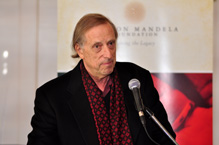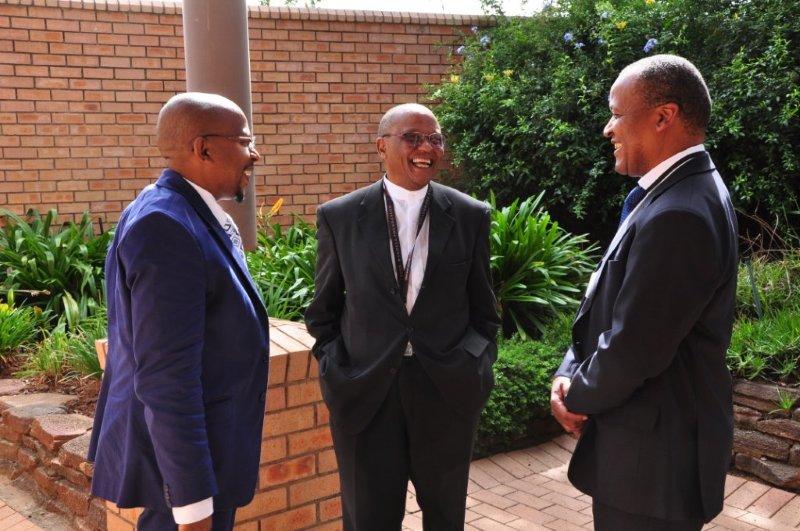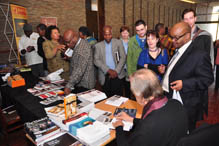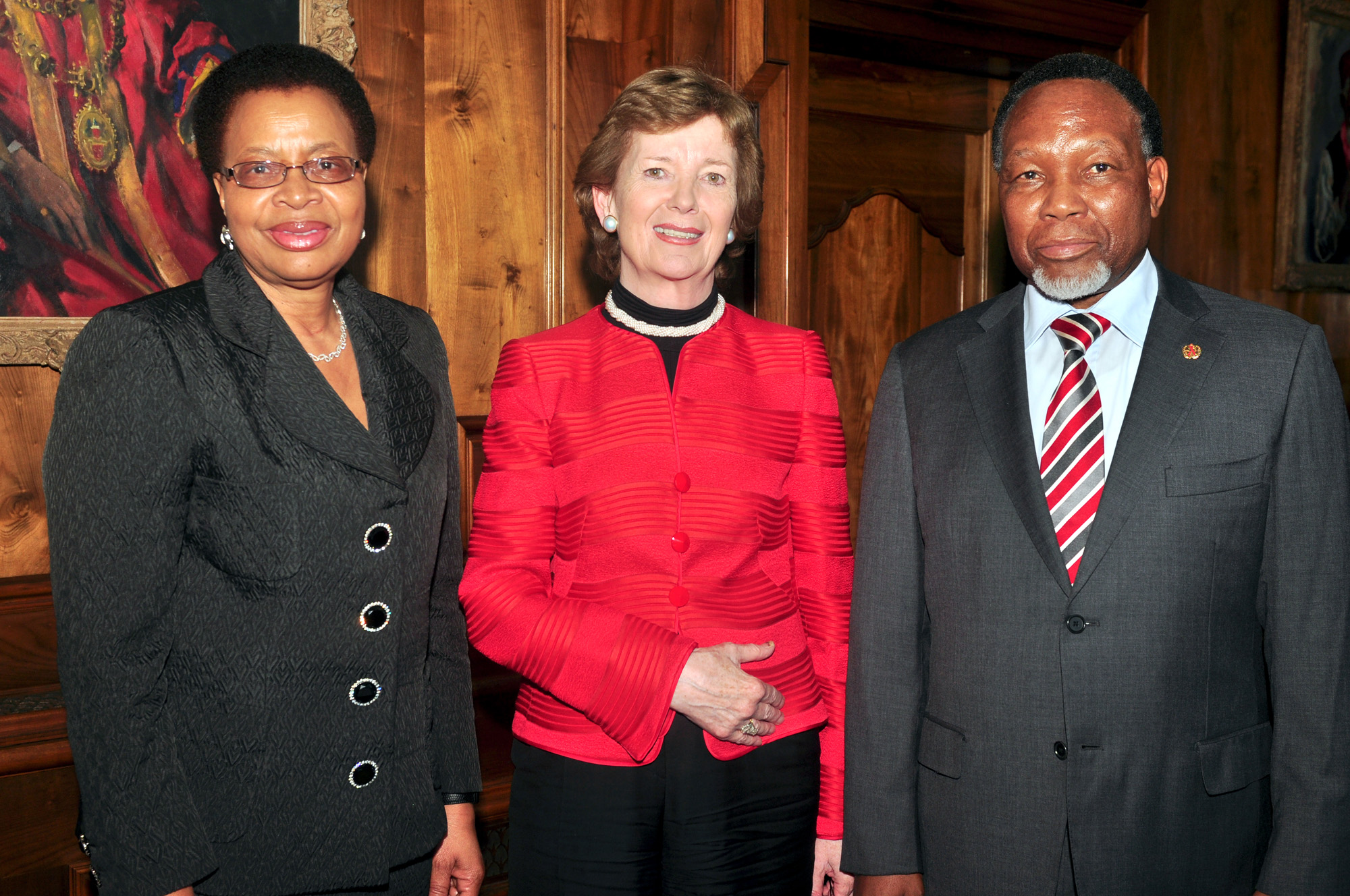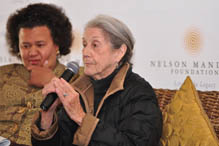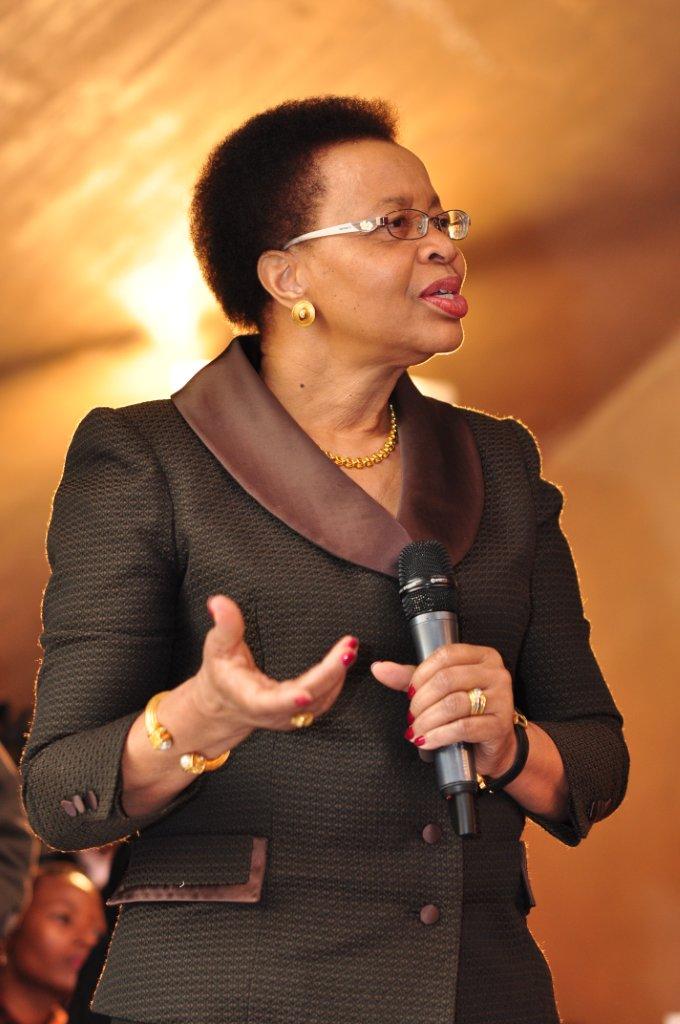
From left to right, Achmat Dangor, Mongane Wally Serote, Nadine Gordimer and Ariel Dorfman
July 29, 2010 – Today acclaimed Chilean-American author and human rights activist Ariel Dorfman joined Nobel laureate Nadine Gordimer, renowned Zimbabwean-born writer Elinor Sisulu, and poet and former political activist Mongane Wally Serote in a discussion on the role of art in consolidating democracy and fighting oppression.
The discussion, entitled “The Necessity of Art: Reflections on Writers and Artists in Defeating Oppression and Deepening Democracy” was held at Freedom Park in Pretoria and gathered together authors, writers, journalists, students, scholars and academics to interrogate how art can help build strong and robust democracies.
The discussion – which was hosted by the Nelson Mandela Foundation in conjunction with Freedom Park and wRite Associates – was led by Serote and he started the conversation by introducing the discussants as not just critically-acclaimed writers but also people of strong opinion.
He said: “I want to introduce them as people who hold very strong views. They are fighters in their own right and they are people [who] are not afraid to makes choices and decisions whether they are popular or not.”
Serote explained that he had lived long enough to see that democracy is susceptible to “total abuse” and that intellectuals want to push boundaries and innovate to make the world a better place. He then called on Dorfman to start the discussion on how writers contribute to building stronger democracies.
Dorfman began by confirming Serote’s introduction: “Artists and writers are troublemakers and I am going to start by causing trouble.”
Dorfman started by telling the audience that for many years he did not believe that former Chilean president, Salvador Allende, had committed suicide, rather believing that he had been killed by General Augusto Pinochet’s military during the coup that took place on September 11, 1973. He explained that he had struggled to come to terms with this reality and that it was not until democracy returned to Chile that he was able to say or even write that Allende had committed suicide.
Dorfman was making the point that, during war and conflict, there are certain things that writers tend to keep quiet about because to speak about them would undermine the struggle movement and the fight for democracy.
He elaborated on how he at times struggled to be loyal to what he felt to be true, and that he had to learn to find ways to tell difficult stories while still being responsible.
He said: “During democracy you can fight against oppression and, while fighting oppression, you can find ways of deepening democracy.”
He also touched on how, when writing in a democratic context, writers are often be re-exiled as people. New governments might not like what they are saying and their unpicking of uncomfortable issues and problems can cause them to become unpopular.
He read a poem that he wrote at the time of the United States’ invasion of Iraq as an example of the ways that writers ask the difficult questions that help to strengthen democracy.
Following on from Dorfman, Gordimer brought the humanity of writers into the discussion.
She explained that, in her opinion, you cannot just be a writer. A writer is also human and this, combined with an innate ability to write and a desire to explore the complexities of life and society, is where the power of writers rests.
She pointed to Dorfman as a prime example of how this humanity combines exquisitely with innate writing ability and a drive to explore and discover life.
She said: “The complexity of democracy makes art a necessity far beyond the need for information.”
Serote then called on Elinor Sisulu to join the discussion.
Sisulu opened by agreeing with Dorfman that defeating oppression is good for the soul but bad for the body – in that writers are often in physical danger – and that deepening democracy is a complex process.
She said: “Deepening democracy is a complicated thing. It is easy to fight your enemy but it is not easy to fight your friend.”
She mentioned the Protection of Information Bill currently being debated in Parliament, and how the debates that are taking place in South Africa around this bill echo those in Zambia, Zimbabwe and Malawi.
She said: “The challenge is there for writers. When we fight oppression ... we must speak, and much of the fight is [in] making information available. People don’t see that deepening democracy requires a fight.”
Referring to Dorfman, Serote and Gordimer’s work she said: “Writing that works best in defeating oppression is that which transcends national boundaries.”
Following the panel discussion the audience were invited to ask questions. Jacob Bogopane, a tour guide at Freedom Park, asked what is being done to improve schoolchildren’s access to books and exposure to writers.
Dorfman spoke of an initiative in Chile, where people donate books and these are then left in public places to circulate throughout the city. “In Chile we had very cheap books on newsstands as well as library buses,” he added.
Prior to the “Necessity of Art” discussion, Dorfman, Gordimer and Dangor went on a tour of Freedom Park, which tells of South Africa’s journey to becoming a free and democratic society.
Dorfman said: “It is very moving for me to be here at Freedom Park. I know how difficult freedom is to struggle for and especially to strengthen and deepen.”
